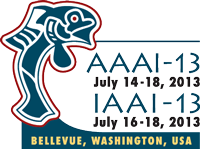The following entry is a special contribution to this blog from Douglas H. Fisher, Associate Professor of Computer Science at Vanderbilt University. This year Doug and Carla Gomes (Cornell University) were co-chairs of the Computational Sustainability and Artificial Intelligence (AI) track at the Twenty-Seventh Conference on Artificial Intelligence on July 14-18, 2013 in Bellevue, Washington. In this entry, Doug highlights the best paper awards for this track, sponsored by the Computing Community Consortium.
 The Twenty-Seventh AAAI Conference on Artificial Intelligence (AAAI-13) convened last month in Bellevue, Washington. For the third consecutive year there was a special track on Computational Sustainability, a nascent and growing field of computing that is concerned with the application of computer science principles, methods, and tools to problems of environmental and societal sustainability. This is not a one-way street, however, because sustainability problems force computer scientists into new theory, as well as new practice. For example, sustainability problems require extraordinary attention to solution robustness (e.g., so that a so-called optimal solution doesn’t catastrophically fail with an environmental change) and issues of uncertainty, ranging from uncertainties in environmental sensor readings to uncertainties in the budget awarded by a state legislative body for wildlife management!
The Twenty-Seventh AAAI Conference on Artificial Intelligence (AAAI-13) convened last month in Bellevue, Washington. For the third consecutive year there was a special track on Computational Sustainability, a nascent and growing field of computing that is concerned with the application of computer science principles, methods, and tools to problems of environmental and societal sustainability. This is not a one-way street, however, because sustainability problems force computer scientists into new theory, as well as new practice. For example, sustainability problems require extraordinary attention to solution robustness (e.g., so that a so-called optimal solution doesn’t catastrophically fail with an environmental change) and issues of uncertainty, ranging from uncertainties in environmental sensor readings to uncertainties in the budget awarded by a state legislative body for wildlife management!
The 16 papers of the Computational Sustainability (CompSust) track of AAAI covered sustainability problems in natural environment, to include various forms of resource management (e.g., species management, wildfire control), and the built environment (e.g., smart grid, building energy usage). The papers were arranged in four presentation sessions, organized by AI themes of MDPs and sequential processes, optimization and search, data mining, and multi agent systems.
Two papers were selected for best paper awards based on reviewer assessments, including a student award. These awards, sponsored by the Computing Community Consortium (CCC), were presented at the opening reception of AAAI-13. Authors received travel support from the CCC, as well as certificates, prepared by the CCC, printed by AAAI, and signed by the co-chairs of the CompSust track.
The best paper award in the Computational Sustainability track at AAAI-13 went to Daniel Sheldon, Andrew Farnsworth, Jed Irvine, Benjamin Van Doren, Kevin Webb, Thomas G. Dietterich and Steve Kelling for Approximate Bayesian Inference for Reconstructing Velocities of Migrating Birds from Weather Radar. The abstract of their paper reads:
Archived data from the WSR-88D network of weather radars in the US hold detailed information about the continent-scale migratory movements of birds over the last 20 years. However, significant technical challenges must be overcome to understand this information and harness its potential for science and conservation. We present an approximate Bayesian inference algorithm to reconstruct the velocity fields of birds migrating in the vicinity of a radar station. This is part of a larger project to quantify bird migration at large scales using weather radar data.
The significance of this project, funded by the National Science Foundation and the Leon Levy Foundation, from a sustainability perspective lies in characterizing the patterns of bird migration over long periods of time, and disruptions in these patterns, with technical challenges of distinguishing migrating birds from other biological targets like bats and insects, as well as distinguishing flocks from weather phenomena.
The best student paper for the Computational Sustainability track went to Huijuan Shao, first author of A Temporal Motif Mining Approach to Unsupervised Energy Disaggregation: Applications to Residential and Commercial Buildings, with co-authors Manish Marwah and Naren Ramakrishnan. Their abstract reads:
Non-intrusive appliance load monitoring has emerged as an attractive approach to study energy consumption patterns without instrumenting every device in a building. The ensuing computational problem is to disaggregate total energy usage into usage by specific devices, to gain insight into consumption patterns. We exploit the temporal ordering implicit in on/off events of devices to uncover motifs (episodes) corresponding to the operation of individual devices. Extracted motifs are then subjected to a sequence of constraint checks to ensure that the resulting episodes are interpretable. Our results reveal that motif mining is adept at distinguishing devices with multiple power levels and at disentangling the combinatorial operation of devices. With suitably configured processing steps, we demonstrate the applicability of our method to both residential and commercial buildings.
The sustainability significance of this work is in understanding “systematic trends in consumption patterns with a view toward identifying opportunities for savings.”
Coincidentally, these two papers spanned sustainability issues in the natural and the built environments, a symmetry that was, as noted earlier, also present in the larger population of paper.
Congratulations to this year’s best paper awards, and thanks for their contributions – and to all the CompSust track authors — to a more sustainable planet!









